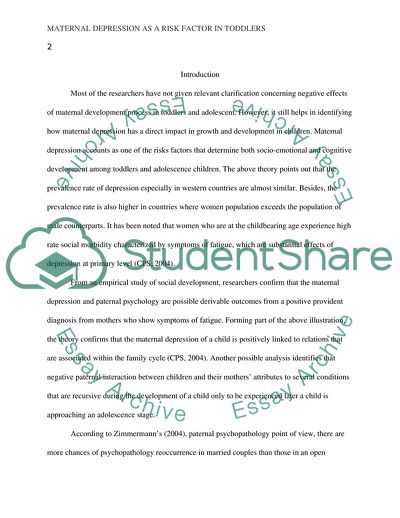Cite this document
(Maternal Depression as a Risk Factor in Toddlers and Adolescents Essay Example | Topics and Well Written Essays - 1500 words, n.d.)
Maternal Depression as a Risk Factor in Toddlers and Adolescents Essay Example | Topics and Well Written Essays - 1500 words. https://studentshare.org/health-sciences-medicine/1835994-maternal-depression-and-child-behavior-problems-in-toddlers
Maternal Depression as a Risk Factor in Toddlers and Adolescents Essay Example | Topics and Well Written Essays - 1500 words. https://studentshare.org/health-sciences-medicine/1835994-maternal-depression-and-child-behavior-problems-in-toddlers
(Maternal Depression As a Risk Factor in Toddlers and Adolescents Essay Example | Topics and Well Written Essays - 1500 Words)
Maternal Depression As a Risk Factor in Toddlers and Adolescents Essay Example | Topics and Well Written Essays - 1500 Words. https://studentshare.org/health-sciences-medicine/1835994-maternal-depression-and-child-behavior-problems-in-toddlers.
Maternal Depression As a Risk Factor in Toddlers and Adolescents Essay Example | Topics and Well Written Essays - 1500 Words. https://studentshare.org/health-sciences-medicine/1835994-maternal-depression-and-child-behavior-problems-in-toddlers.
“Maternal Depression As a Risk Factor in Toddlers and Adolescents Essay Example | Topics and Well Written Essays - 1500 Words”. https://studentshare.org/health-sciences-medicine/1835994-maternal-depression-and-child-behavior-problems-in-toddlers.


